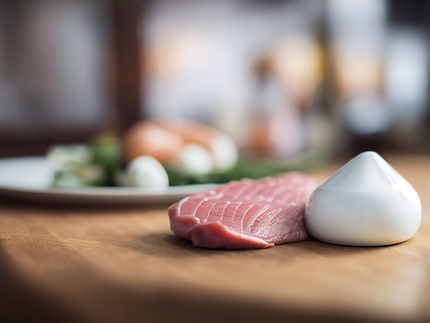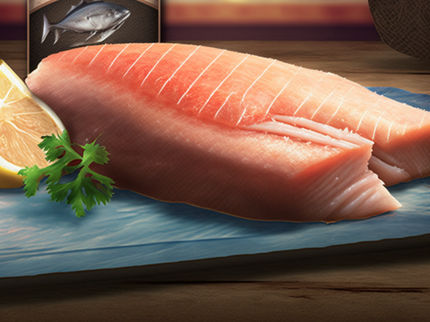Biotechnology: "Our cells are real fish"
BLUU Seafood GmbH, Berlin: Nominated for the German Founder Award 2024 in the StartUp category
In 20 years at the latest, everyone should be saying: Of course I choose cultured fish. It has all the advantages of freshly caught fish, it tastes better, is more sustainable and healthier too. That's a nobrainer!" That's what BLUU founder Dr. Sebastian Rakers says. Fish that is farmed on land - it sounds a bit like science fiction. Strictly speaking, it is fish meat, so-called "cultured fish", with which the food biotech BLUU Seafood is revolutionizing food production.


symbolic picture
computer generated picture


Three billion people worldwide depend on fish - a huge demand with enormous potential. BLUU has used innovative biotechnology to create a sustainable alternative to industrial fishing. The candidates will find out which of the finalists in the "Rising Star" and "StartUp" categories will win the coveted trophy at the award ceremony on September 24, 2024 at the ZDF Capital Studio in Berlin.
BLUU uses cultured fish cells from Atlantic salmon and rainbow trout to produce fish products that can compete in both taste and nutritional value. It is an animal-ethical alternative for consumers without overburdening natural resources. 90 percent of the world's fish stocks are considered overexploited or overfished, according to the United Nations. But with the world's population growing, more and more people are relying on fish as a source of protein. The methods used by BLUU are by no means new. They are based on decades of research and development. "We isolate the cells from the fish and the only thing that changes is where this cell continues to grow and how it is fed - namely in vitro and no longer in the organism," says BLUU founder Dr. Sebastian Rakers (43), describing the wonderful fish (cell) multiplication made possible by innovative biotechnology: "Our cells are real fish."
Dr. Rakers, a trained cell and marine biologist, has more than sixteen years of experience in the development of cell cultures from various fish species. He was deputy head of the Marine Biotechnology department at the Fraunhofer Development Center for Marine and Cellular Biotechnology (EMB, now Fraunhofer IMTE) in Lübeck. His co-founder Simon Fabich (40) has a background in business administration. After studying in St. Gallen, Fabich gained experience in management consulting and founded several companies of his own. During a stay in China, he realized that the increasing demand for meat and fish among the growing middle class could not be met sustainably. This motivated him, together with an impact investor, to support scientists such as Sebastian Rakers.
The production of cultured fish cells is the core area of BLUU - a sustainable alternative to industrial fishing and aquaculture. By growing cells in controlled environments, BLUU can produce fish products that are free from pollutants such as microplastics. At the same time, it offers the opportunity to significantly reduce the ecological footprint of animal protein consumption. A remarkable milestone in BLUU's young history was Dr. Oetker's participation in the first financing round in 2020 with a capital injection of seven million euros - the beginning of an extremely valuable partnership.
Following the successful product launch of fish balls and fish sticks in summer 2022, BLUU left laboratory status in January 2024 and began piloting at its new 2,000 square meter site in Hamburg. Due to regulatory requirements, market entry is initially planned for the end of 2024 in Singapore. "Singapore has set itself the goal of producing almost a third of the proteins it needs in the country by 2030. This holds huge potential," says Rakers. "We are convinced that we can be approved not only as a food but also as an ingredient. This would expand the market for us enormously." The USA is to be opened up in 2025. Sales in the EU are planned from 2026.
The finalists in the StartUp category, one- to three-year-old companies that have been particularly successful in establishing their business idea on the market, are
- BLUU Seafood GmbH, Berlin: Fish that is bred on land! BLUU has used innovative biotechnology to create a sustainable alternative to industrial fishing. Fish cells from Atlantic salmon and rainbow trout are used to produce fish products that can compete in both taste and nutritional value; an animal-ethical alternative for consumers without overburdening natural resources.
- WeSort.AI GmbH, Würzburg: Scratched, crushed, soiled? Nevertheless, no yoghurt pot goes unrecognized in the waste sorting process. WeSort.AI's AI distinguishes between over seven million different products and can read the brand, calculate the volume and determine the weight of a PET bottle, for example. Sorting is fast and almost 100 percent accurate. Human sorters take five times longer and are only half as accurate.
The Up-and-Coming category recognizes companies that are less than nine years old and have already achieved exceptional growth. This year's nominees are
- Dermanostic GmbH, Düsseldorf: dermanostic's digital dermatology practice offers uncomplicated and fast dermatological treatment. Three photos of the skin change are taken via smartphone app and a few questions are answered - the so-called anamnesis. A short time later, the dermanostic dermatologist transmits the diagnosis via app, not in "doctor's Latin", but in understandable language. If necessary, a prescription is sent directly to the desired pharmacy or home.
- E-Lyte Innovations GmbH, Kaiserslautern: Electrolytes are the lifeblood of modern energy storage systems. E-Lyte Innovations relies on research, development and close cooperation with leading car manufacturers and cell producers and has thus established itself as a leading company in the development and production of electrolytes. Customized electrolyte solutions and recipes are at the heart of the company's strategy.
- "fobizz" from 101 Skills GmbH, Hamburg: Every second teacher in Germany uses fobizz! With over 400,000 users, it is the leading German-language platform for further education and training for teachers. As a provider of digital and AI-supported tools for teachers and schools, fobizz sets standards in the digital education landscape. Current top topic: Artificial intelligence in the classroom, both as further training for teachers and for integration into lessons.
All finalists receive individual advice tailored to their needs from Porsche Consulting. In addition, members of the Board of Trustees of the German Start-up Award will act as mentors for each finalist for a period of two years and make their expertise and experience available. The companies also receive media training at ZDF and access to the German Entrepreneurs' Award network.
The companies were nominated by the approximately 300 experts of the German Start-up Award. They come from renowned companies, technology centers, ministries, start-up initiatives and the Sparkassen-Finanzgruppe. The experts have years of experience with start-ups and very good industry knowledge. Companies also had the opportunity to submit an unsolicited application. The Federal Ministry for Economic Affairs and Climate Protection supports the German Start-up Award.
Note: This article has been translated using a computer system without human intervention. LUMITOS offers these automatic translations to present a wider range of current news. Since this article has been translated with automatic translation, it is possible that it contains errors in vocabulary, syntax or grammar. The original article in German can be found here.
Other news from the department business & finance
Most read news
More news from our other portals
Something is happening in the food & beverage industry ...
This is what true pioneering spirit looks like: Plenty of innovative start-ups are bringing fresh ideas, lifeblood and entrepreneurial spirit to change tomorrow's world for the better. Immerse yourself in the world of these young companies and take the opportunity to get in touch with the founders.
See the theme worlds for related content
Artificial intelligence (AI) for food and beverages
Artificial intelligence (AI) is optimizing the food and beverage industry through automated quality control and more accurate demand forecasting. AI plays a particularly important role in product development by analyzing taste preferences and market trends. This allows new products to be developed that are better tailored to consumer needs, increasing efficiency and customer satisfaction.

Artificial intelligence (AI) for food and beverages
Artificial intelligence (AI) is optimizing the food and beverage industry through automated quality control and more accurate demand forecasting. AI plays a particularly important role in product development by analyzing taste preferences and market trends. This allows new products to be developed that are better tailored to consumer needs, increasing efficiency and customer satisfaction.































































